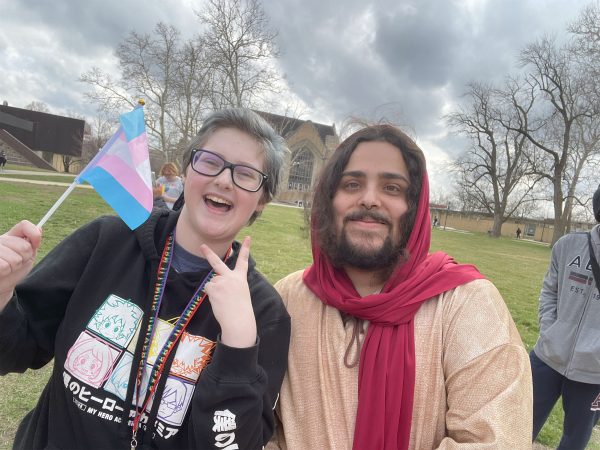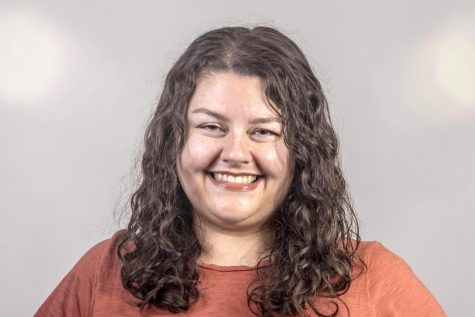Open Letter: Africana studies, philosophy essential to university mission
February 2, 2017
A preview of this letter appeared in our print edition on Feb. 2nd, 2017.
Dear President Glassman:
We, the undersigned members of the Women’s Studies program at Eastern, protest in the strongest terms possible any proposal to eliminate major programs in Africana studies and philosophy at Eastern, for the following reasons.
- Africana studies and philosophy expose our students totheories and methods that align perfectly with Eastern’s learning goals of critical thinking, effective communication, and responsible citizenship. These programs represent two pillars of a liberal education. Although in some ways they seem very different—one representing ancient knowledge, the other contemporary epistemology; one a traditional discipline, the other interdisciplinary; one stereotyped (incorrectly) as the concern of the privileged, the other (equally incorrectly) as only the domain of those pushing toward empowerment—both offer our students critical perspectives on ethics and social justice as well as preparation for responsible citizenship and participation in the democratic process in our increasingly global and interconnected world.
- One purpose ofregional comprehensive public universities is democratization of opportunity through making higher education available to the populace. Eastern has always provided world-class educational opportunities to students of all backgrounds, not just to those of wealth and privilege. We assert that Eastern is ethically obligated to continue this practice. All our students deserve access to the knowledges and critiques developed in Africana studies and philosophy just as much as do those students whose families can afford expensive private universities.
- It has been suggested that we could keep general education courses in these departments without supporting the majors; this makes no sense as it does not save very much (if any) money for Eastern.In fact, cutting programs may cost money, as Western is finding.
- Moreover, eliminating thesemajors makes no sense intellectually. What happens, then, to the undecided student who takes a wonderful course in her first year and decides she wants to major in Africana studies or philosophy? She transfers to another university. Are we so wealthy that we can afford to advise students away from Eastern?
- Furthermore, Africana studies in particular serves many of our students of color in ways that exceed even the reach of its courses. The fact that Eastern—situated in a small city within a rural community—has Africana studies on our campus makes us an attractive option for families of African-American students seeking new opportunities. Sending one’s African-American student to a predominantly white rural community involves a leap of faith that many white people find difficult to comprehend. Families are concerned about their students’ safety; recent events in the national news will only intensify those concerns. The future of the U.S. is increasingly diverse. The demographic information about college student populations in the 2020s is clear: we will be serving more students of color every year. Surely, this is not the time for Eastern to take a public stance against these students and their families by eliminating or relegating to non-major status one of the most visible elements of our educational support system for students of color.
This letter is signed by 30 members of the Women’s Studies program at Eastern:
Melissa Ames, Assoc. Professor, English and women’s studies
Dagni Bredesen, Professor, English and women’s studies
Julie Campbell, Professor, English and women’s studies
Lynne Curry, Professor, history and women’s studies
Linda Coleman, Professor Emerita, English and women’s studies
Gene Deerman, Assoc. Professor, sociology/anthropology
Sace Elder, Professor, history and women’s studies and Graduate Coordinator, history
Terri Fredrick, Professor, English
Michael Gillespie, Assoc. Professor, sociology/anthropology
Angela Glaros, Asst. Professor, sociology/anthropology
Eunseong Kim, Assoc. Professor, journalism and women’s studies
Bonnie Laughlin-Schultz, Assoc. Professor, history and women’s studies
Jeannie Ludlow, Coordinator of women’s studies and Associate Professor of English
Gail Mason, Professor Emerita, communication studies and women’s studies
Melinda Mueller, Assoc. Professor, political science and women’s studies
Frances Murphy, Professor, family and consumer sciences
Robin Murray, Professor, English and women’s studies
Mildred Pearson, Professor, EC/MLE/MLE
Charlotte Pence, Asst. Professor, English
Catherine Polydore, Assoc. Professor, counseling and student development
Deb Reid, Professor Emerita, history
Sally Renaud, Professor and Interim Chair, journalism
Kristin Routt, Professor, foreign languages
Jad Smith, Professor, English
Jamila Smith, Asst. Professor, English and women’s studies
Carol Stevens, Professor Emerita, English and women’s studies
Jennifer Stringfellow, Assoc. Professor, special education
CC Wharram, Professor, English and Director, Center for the Humanities
Jean Wolski, Professor, theater arts and women’s studies
Marjorie Worthington, Professor, English and women’s studies












































